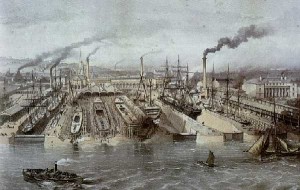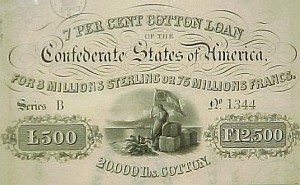 Thursday, April 11, 1861, Richmond – It is the day before Ft. Sumter. Two cousins, joint partners in the prosperous mercantile firm of Davis & Grey, see the impending war quite differently.
Thursday, April 11, 1861, Richmond – It is the day before Ft. Sumter. Two cousins, joint partners in the prosperous mercantile firm of Davis & Grey, see the impending war quite differently.
For Joanna Stuart Davis, war is – and is supposed to be – good business. She is 36, educated, connected, ruthless, and racist. She is indifferent to the South’s success, but not to her own. Clever calculations in many markets – trading for copper rivets, gold bijoux, silver plate, and black people – have made her rich. Money is the key to her standing in an old-line society leery of attractive spinsters lacking a pedigree. When her partner and cousin, James Trenton Grey, approaches her with a scheme for wealth through legalized piracy, she readily agrees.
Grey, 26, disdains the commercial catacombs of Davis & Grey. Impelled by the example of his father’s naval career, Grey wants to fight for his new country – but in relative comfort, as an officer aboard a ship. For him, the war offers a chance for fame and self-vindication. A short, heroic command, even on a poorly armed vessel, will achieve both.
Confident in their separate calculations, Davis and Grey pull strings and Grey gets to sea. But as the war surges out of control, their strings unravel.
Grey’s career is short, but not heroic. His inexperience costs lives, and leaves him injured and ever farther from personal vindication. Davis meanwhile discovers that manipulation is a two-way thoroughfare, one heavily traveled by friends as well as strangers. Along that road her compulsive quest for wealth and security exposes the scars inflicted by a vanished father she wishes dead; and a complicated desire for her much younger cousin that could compromise all she is working toward . . . .



